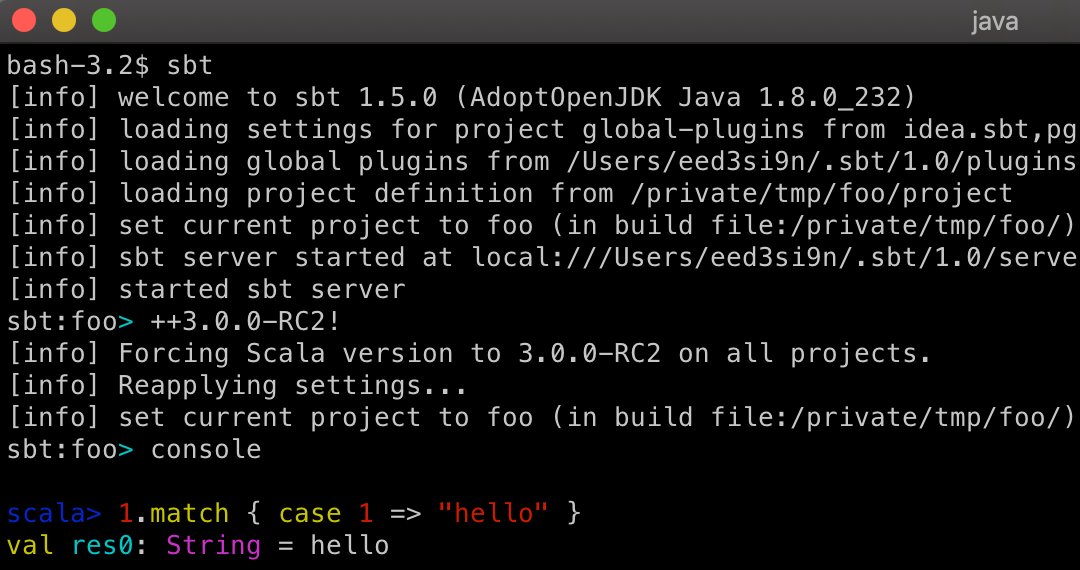

- #SBT SCALA FOR MAC WHICH ONE ZIP OR MSI HOW TO#
- #SBT SCALA FOR MAC WHICH ONE ZIP OR MSI ZIP FILE#
- #SBT SCALA FOR MAC WHICH ONE ZIP OR MSI ARCHIVE#
- #SBT SCALA FOR MAC WHICH ONE ZIP OR MSI FULL#
This is because rpm logs to stderr instead of stdout. Then build your package with: $ rpm:packageBin Then build your package with: $ debian:packageBin PackageDescription := "My longer package description"

PackageSummary in Linux := "My custom package summary" §Minimal Debian settingsĪdd the following settings to your build: lazy val root = (project in file(".")) More information can be found in the Java Server Application Archetype documentation. The one that Play uses by default is called the Java server archetype, which enables the following features: The sbt-native-packager plugins provides a number archetypes. Please consult the documentation on the native packager plugin for more information.
#SBT SCALA FOR MAC WHICH ONE ZIP OR MSI ARCHIVE#
Many other types of archive can be generated including: Invoking the dist task is directly equivalent to invoking the following: $ universal:packageBin The native packager plugin declares the dist task to create a zip file. Play uses the sbt Native Packager plugin. PublishArtifact in (Compile, packageDoc) := falseįor builds with sub-projects, the statement above has to be applied to all sub-project definitions. If this is not necessary, add these lines in build.sbt: sources in (Compile, doc) := Seq.empty Invoke the universal:packageZipTarball task instead of the dist task: sbt universal:packageZipTarballīy default, the dist task will include the API documentation in the generated package.
#SBT SCALA FOR MAC WHICH ONE ZIP OR MSI FULL#
You can also specify a different configuration file for a production environment, from the command line: $ my-first-app-1.0/bin/my-first-app -Dconfig.file=/full/path/to/conf/nfįor a full description of usage invoke the start script with a -h option.įor Unix users, zip files do not retain Unix file permissions so when the file is expanded the start script will be required to be set as an executable: $ chmod +x /path/to/bin/Īlternatively a tar.gz file can be produced instead. The name of the script is your application name, and it comes in two versions, a bash shell script, and a windows. To run the application, unzip the file on the target server, and then run the script in the bin directory.
#SBT SCALA FOR MAC WHICH ONE ZIP OR MSI ZIP FILE#
This produces a ZIP file containing all JAR files needed to run your application in the target/universal folder of your application. Your package is ready in /Users/play-developer/my-first-app/target/universal/ Packaging /Users/play-developer/my-first-app/target/scala-2.13/my-first-app_2. Main Scala API documentation successful. Main Scala API documentation to /Users/play-developer/my-first-app/target/scala-2.13/api. Wrote /Users/play-developer/my-first-app/target/scala-2.13/my-first-app_2.

Set current project to my-first-app (in build file:/Users/play-developer/my-first-app/) Loading project definition from /Users/play-developer/my-first-app/project Loading global plugins from /Users/play-developer/.sbt/0.13/plugins In the Play console, simply type dist: $ dist The dist task builds a binary version of your application that you can deploy to a server without any dependency on sbt, the only thing the server needs is a Java installation. If you are using JPA, you need to take a look at Deploying Play with JPA. You must generate your own secret to use when deploying to production.
#SBT SCALA FOR MAC WHICH ONE ZIP OR MSI HOW TO#
To read more about how to do this, see Configuring the application secret. §The application secretīefore you run your application in production mode, you need to generate an application secret.

Let’s start by using the recommended way, creating a distribution artifact. There are several ways to deploy a Play application in production mode. When using run, on each request, Play checks with sbt to see if any files have changed, and this may have significant performance impacts on your application. We have seen how to run a Play application in development mode, however the run command should not be used to run an application in production mode. Integrating with Akka Typed & Cluster Sharding.English ▾ English българин Français 日本語 Türkçe Deploying your application


 0 kommentar(er)
0 kommentar(er)
